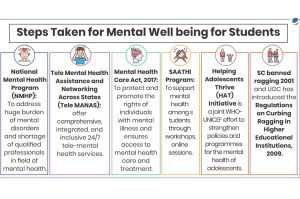Loreto College Launches SWOSTI: Kolkata’s Loreto College has taken a groundbreaking initiative in addressing one of the most urgent concerns of today’s youth—mental health. By establishing SWOSTI Mental Health Services, the college is setting a precedent for educational institutions to take direct responsibility in supporting psychological well-being.

What makes this project unique is its student-driven approach. Under the supervision of qualified mental health professionals, postgraduate psychology students will conduct screening and preliminary assessments of patients, while therapy and treatment will be handled by experienced experts. This dual focus on education and service ensures that young professionals gain valuable hands-on experience while simultaneously extending support to the community.
Why Mental Health in Colleges Matters
Mental health is no longer a hidden issue in India—it is an everyday reality. For students, academic stress, performance anxiety, financial struggles, social pressure, and uncertainty about the future create enormous psychological burdens. Reports across India reveal troubling trends:
- A recent survey by the Indian Journal of Psychiatry highlights that nearly one in five college students in India show symptoms of depression or anxiety.
- A 2023 research review published on NCBI points out that mental health challenges among adolescents and young adults range from emotional distress to addiction and suicidal ideation.
- Kolkata itself has witnessed disturbing patterns. Several NGOs report that 14–19% of students in Bengal struggle with suicidal thoughts, exacerbated by academic failures, social stigma, and digital isolation.


Against this backdrop, Loreto’s move is both timely and visionary.
What SWOSTI Offers
The clinic is designed as a multidisciplinary center with services combining:
- Psychiatry – for diagnosis and medication where necessary.
- Clinical Psychology – to provide structured therapy and coping mechanisms.
- Special Education – to support individuals with learning disabilities or developmental challenges.
- Social Work – ensuring outreach, awareness, and family counseling.
Appointments will be scheduled, and a dedicated phone line will be available for anyone seeking help. Confidentiality will remain a core principle, helping combat the fear and stigma that often prevent people from seeking mental health assistance.
Empowering the Next Generation of Psychologists
Loreto College recently introduced a 15-seat postgraduate psychology program, and SWOSTI is a natural extension of this academic effort. Instead of limiting education to textbooks and classroom theory, the program ensures that students gain clinical exposure and real-world problem-solving skills.
Principal Sister A Nirmala emphasized:
“Seeking help is a sign of strength, not weakness. This initiative is not only about serving society but also about preparing a generation of professionals who are empathetic and resilient.”


By directly involving students, the college is instilling responsibility, compassion, and confidence in future mental health practitioners.
India’s Mental Health Crisis: Numbers That Speak
To understand why initiatives like SWOSTI matter, one must look at the numbers:
- The World Health Organization (WHO) estimates that 56 million Indians suffer from depression, and 38 million suffer from anxiety disorders. (WHO Data)
- Suicide is the leading cause of death among 15–29-year-olds in India, as per National Crime Records Bureau (NCRB) reports.
- India spends less than 1% of its total healthcare budget on mental health, far below the global average.
Clearly, educational institutions cannot wait for state mechanisms alone—they must step up, just as Loreto has.
Similar Efforts Across India
Loreto’s initiative does not stand alone. Other states and institutions have experimented with mental health models:
- Kerala’s Jeevani Mental Health Programme offers counseling across 66 colleges, ensuring accessibility beyond working hours.
- In Mumbai, select colleges have hosted campus screening camps to identify students struggling during exam seasons.
- NGOs like the Lifeline Foundation in Kolkata provide tele-counseling and crisis intervention, demonstrating the potential of community engagement.
These examples show that student-centered, institution-driven care can fill gaps where public healthcare falls short.
The Stigma Barrier
One of the biggest challenges in India is stigma. Many students hesitate to seek help because mental illness is still associated with weakness or failure. Families often discourage counseling, preferring silence over acknowledgment.
Loreto’s approach directly challenges this by normalizing mental health conversations within the college ecosystem. By encouraging students to take part in both receiving and delivering care, it creates a culture of openness.
A Model for the Future
SWOSTI could serve as a blueprint for universities nationwide. If more colleges establish such centers, it could lead to:
- Early detection of mental health issues.
- Reduced student dropouts due to psychological struggles.
- Holistic professional training for psychology students.
- Community outreach beyond campus walls.
In the long run, this model could integrate with national healthcare policies, making mental health support a mandatory part of every higher education institution.
Loreto College Launches SWOSTI: Looking Ahead
The clinic is expected to become fully operational after the Puja vacation. Future plans include:
- Collaboration with city schools and NGOs.
- Hosting awareness workshops for teachers, parents, and communities.
- Publishing data and research on student mental health patterns.
- Expanding services to digital counseling platforms for greater reach.
Conclusion
Loreto College’s launch of SWOSTI Mental Health Services is more than just an academic initiative—it is a social revolution in student welfare. By combining education, service, and compassion, the college is tackling one of the most pressing challenges of our time.
At a moment when India is witnessing rising levels of depression, anxiety, and suicide among youth, SWOSTI offers a ray of hope. It is a reminder that mental health care must begin where the future is shaped—inside our colleges and universities.
Also read: Home | Channel 6 Network – Latest News, Breaking Updates: Politics, Business, Tech & More

